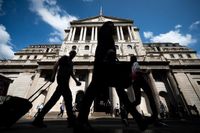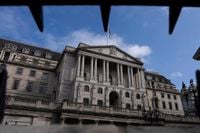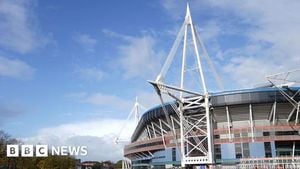The Bank of England has made a significant move in response to ongoing economic challenges, cutting interest rates from 4.5% to 4.25% on Thursday, May 8, 2025. This decision marks the fourth reduction since rates peaked at 5.25% last year, and it reflects the Bank's efforts to cushion the UK economy against the adverse effects of Donald Trump’s trade war.
The Monetary Policy Committee (MPC) voted to lower borrowing costs, attributing the decision to a combination of factors, including a weaker economic outlook and lower inflation expectations, in part due to the higher tariffs imposed by the U.S. on UK exports. The MPC's split vote saw five members supporting the quarter-point cut, while two members pushed for a more substantial reduction to 4% and another two opted to maintain the rates at 4.5%.
Bank governor Andrew Bailey emphasized the need for a cautious approach, stating, "Inflationary pressures have continued to ease, so we’ve been able to cut rates again today. The past few weeks have shown how unpredictable the global economy can be. That’s why we need to stick to a gradual and careful approach to further rate cuts. Ensuring low and stable inflation is our top priority." This sentiment reflects the committee's concerns about the ongoing effects of U.S. tariffs, which have imposed a blanket 10% tariff on all UK goods and a 25% charge on steel, aluminum, and cars.
The Bank's analysis indicates that while these tariffs are likely to depress both global and UK economic growth, the impact may be relatively minor, projecting growth to be 0.3% lower and inflation to decrease by 0.2%. Despite this, the MPC raised its forecast for UK economic growth this year from 0.75% to 1%, primarily due to unexpectedly strong output in the first quarter. However, underlying growth remains weak at just 0.1% per quarter.
Looking ahead, the Bank expects inflation to rise temporarily, peaking at 3.5% in the third quarter due to recent increases in household bills, including energy and water prices. However, it anticipates a drop in inflation towards the end of next year, settling just below the 2% target. The MPC's cautious stance is evident as it navigates the complexities of the current economic climate.
The decision to cut rates comes amidst rising concerns about the impact of Trump’s tariffs on UK businesses, with reports indicating that 17% of companies with more than ten employees expect to be affected by the tariffs. These businesses are particularly worried about falling demand and the potential need to increase prices for consumers.
Chancellor Rachel Reeves welcomed the interest rate cut, stating, "This interest rate cut is welcome news, and the fourth since we came into government making it cheaper for businesses to borrow, reducing the cost of a new mortgage, making homeownership more accessible, car finance more affordable, and easing the pressure on those paying off personal loans. But there is more to do, and I know families are still facing cost of living pressures." Her comments highlight the government's commitment to addressing the economic challenges faced by households.
As the Bank navigates these turbulent economic waters, financial markets are increasingly betting on further monetary easing, with predictions that rates could fall by nearly a full percentage point by the end of the year. This shift suggests that the MPC may need to reconsider its previous stance on gradual policy changes.
Guillermo Felices, a global investment strategist at PGIM Fixed Income, noted that domestic wage growth and services inflation are running lower than previously projected. He added, "Add to that the deflationary impact of global trade tensions, lower energy prices, and a stronger Sterling, this meeting seems like the perfect time for the MPC to guide away from their ‘gradual’ approach to cuts." This perspective reflects the growing sentiment among economists that more aggressive measures may be necessary to stimulate the economy.
While the Bank's current forecasts are based on the existing tariff situation, it remains to be seen how negotiations with the U.S. regarding a potential trade deal will unfold. The UK government is actively pursuing a deal that could mitigate the impact of the tariffs, but even if successful, the broader economic slowdown caused by the trade war is likely to continue affecting the UK economy.
In the backdrop of these developments, the Bank is also contending with the effects of a recent increase in National Insurance contributions, which could impact employment, wages, and prices. The Bank has indicated that the increase in contributions, which came into effect last month, has had a relatively small impact thus far, although business confidence has taken a hit in recent months.
As the Bank of England continues to grapple with the complexities of the global trade landscape and its implications for the UK economy, the focus remains on ensuring stable inflation and fostering economic growth. The upcoming months will be crucial in determining the trajectory of interest rates and the overall economic outlook for the UK.
In summary, the Bank of England's decision to cut interest rates to 4.25% reflects a proactive approach to address the challenges posed by external factors, particularly the ramifications of Trump's trade policies. As the situation evolves, stakeholders will be closely monitoring how these decisions impact both the economy and everyday consumers.





